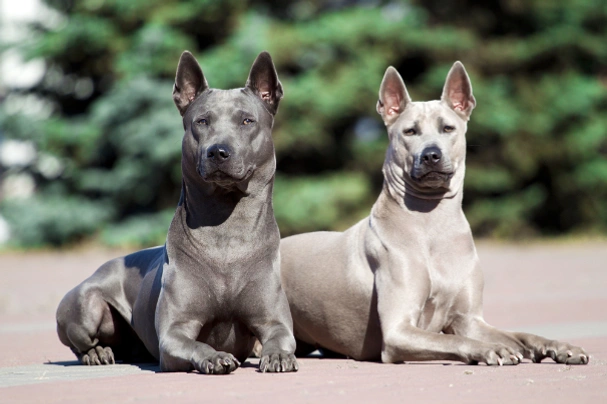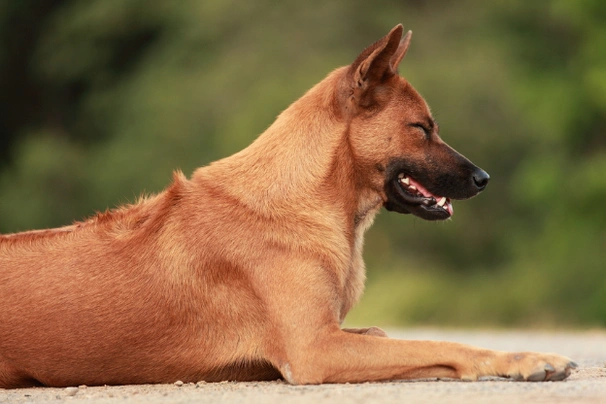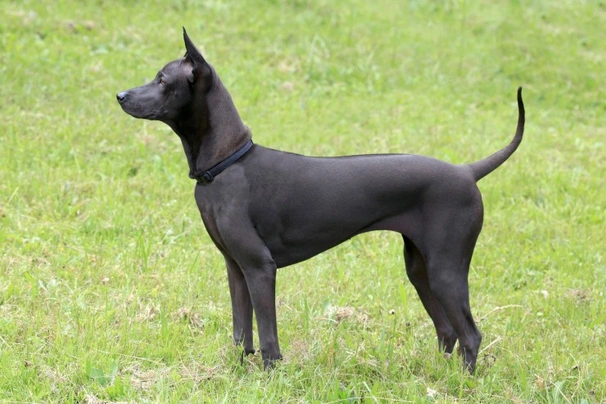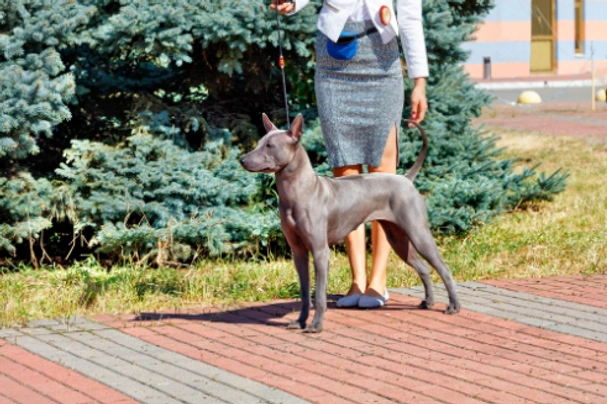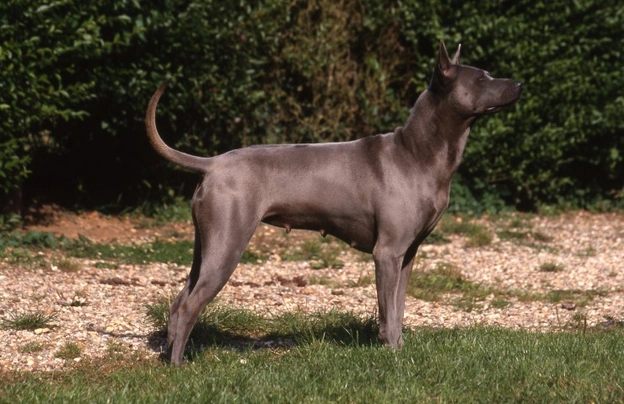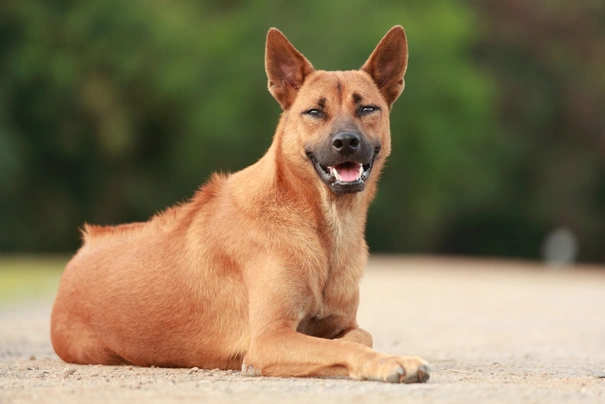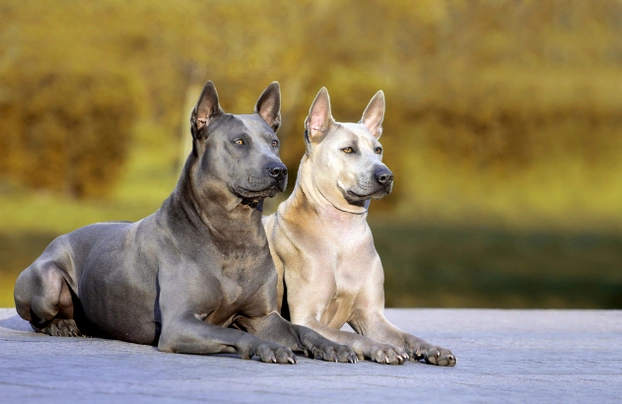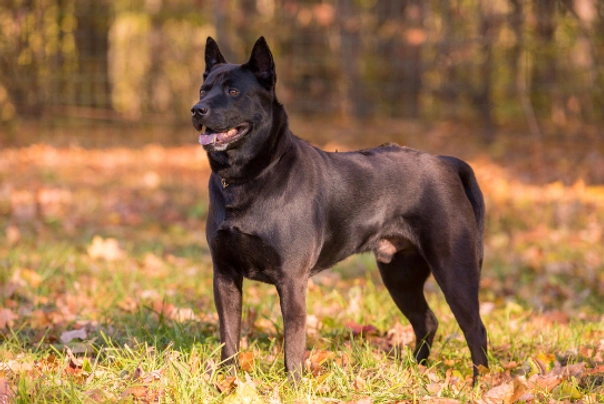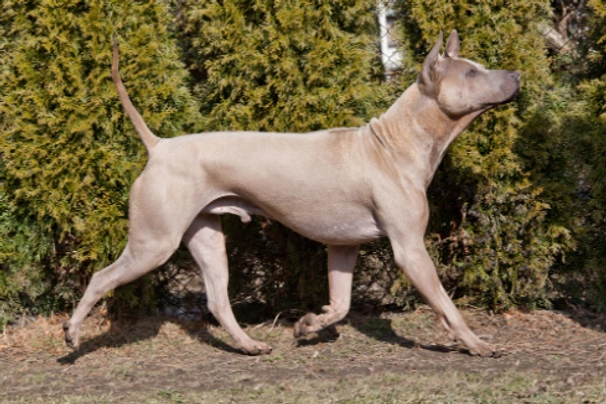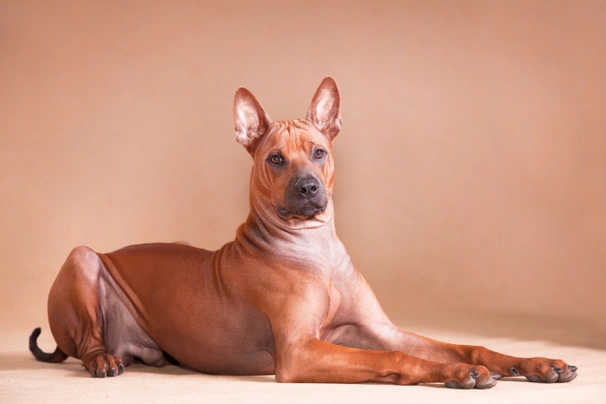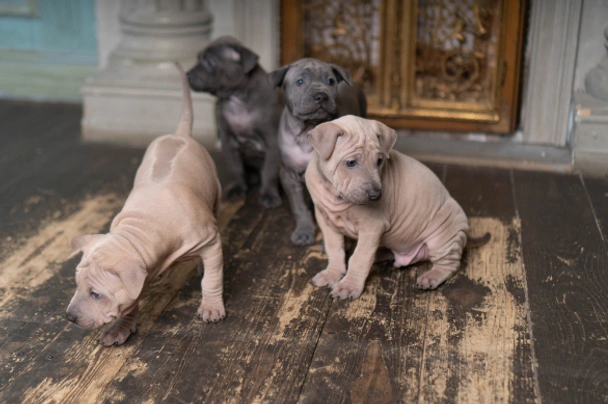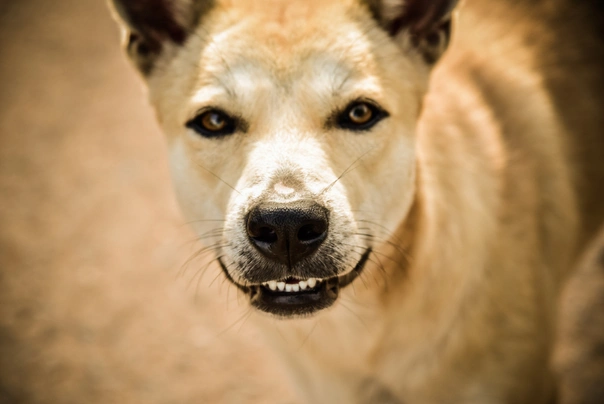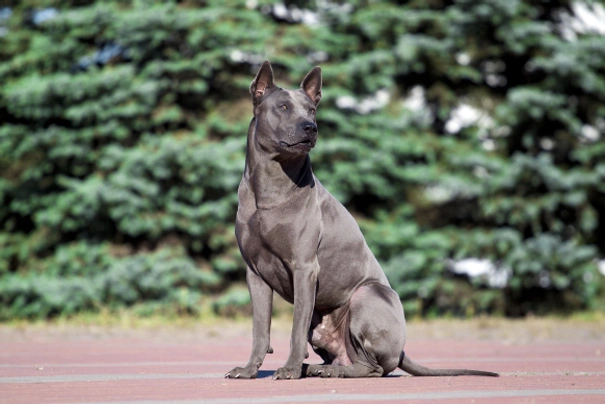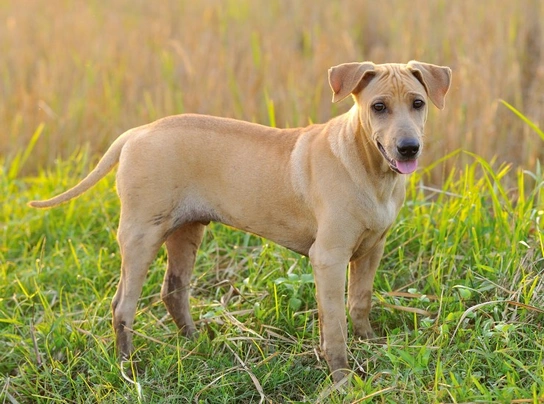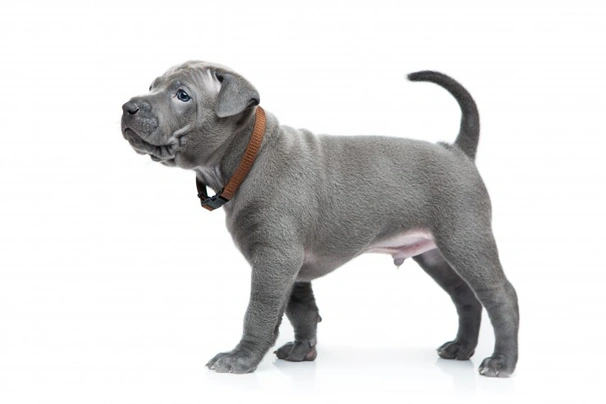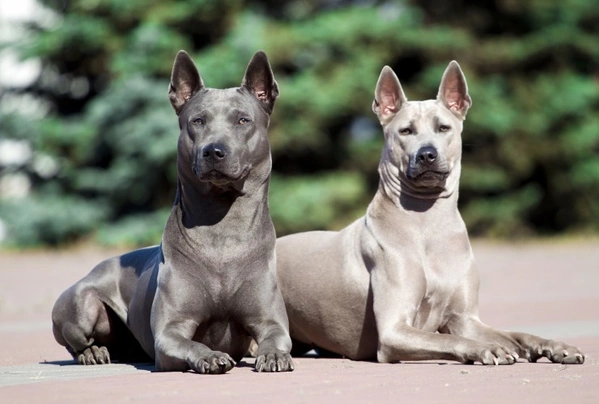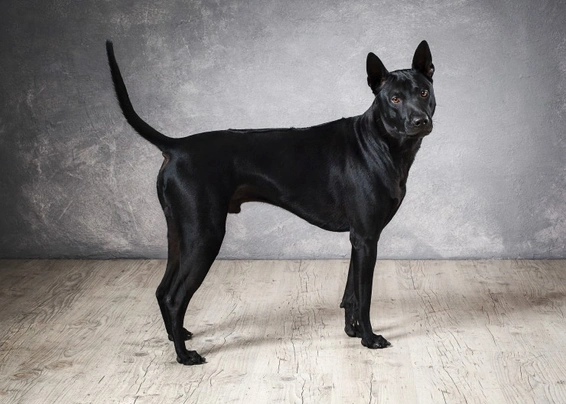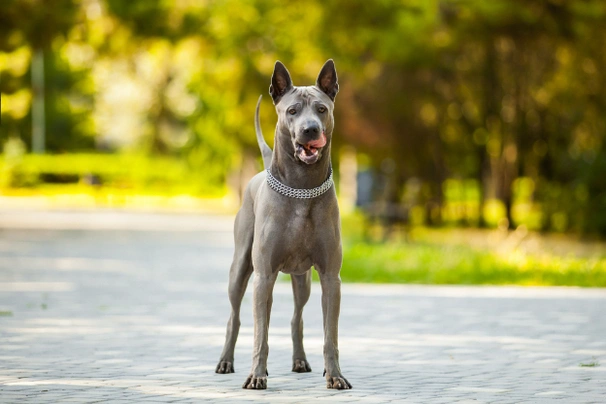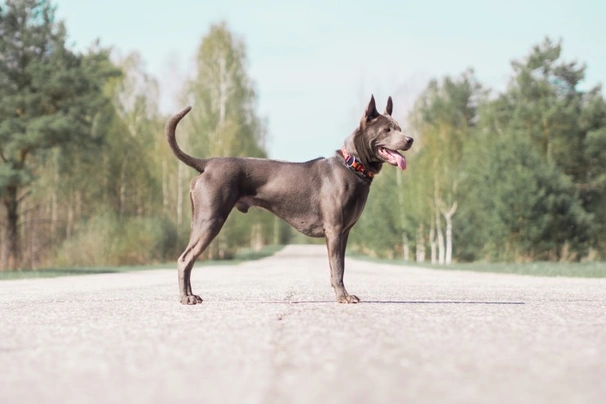Thai Ridgeback
Pros
Cons
Introduction of the Thai Ridgeback
The Thai Ridgeback is a rare breed that first originated in a remote region of Thailand. These handsome medium sized dogs are thought to be one of the purest breeds for this very reason having not been in contact with other breeds. As such they retain extremely pure blood lines and have always been highly prized in their native country.
The breed is not recognised by The Kennel Club (March 2018) but Thai Ridgebacks are recognised as a breed by the United Kennel Club of America and as such a breed standard has been established. Finding a well-bred Thai Ridgeback puppy in the UK is challenging and they tend to be very expensive for this reason and anyone wanting to share a home with one of these elegant dogs would need to register their interest with breeders for the pleasure of doing so.
History of the Thai Ridgeback
The Thai Ridgeback is thought to be one of the oldest breeds on the planet with ancient artefacts establishing that they were found living on the isolated island of Pho Quoc which was originally part of Siam in southeast Thailand which is now Vietnam for over four thousand years. One of the first written records of the breed was found in an ancient manuscript that dates to the reign of King Songthan of Ayutta.
They were bred to hunt large prey which included wild boar tapirs and deer as well as smaller prey like birds. However they were also highly prized guard dogs that would accompany carts and were known as "cart-following dogs". Thai Ridgebacks were known to be great guard dogs on farms and other properties. Thanks to the remoteness of these islands Thai Ridgebacks did not come into contact with other dogs which ensured the breed’s bloodlines remained pure throughout the centuries.
It was only when modern transport means were introduced to Thailand that the breed became more widely known not only in the country but in other parts of the world too. Over time Thai Ridgebacks were no longer used for hunting and were used to guard and protect instead. In Thailand the breed has always been a “status symbol” for anyone who owned one. The Thai Government as well as the Thai military have always held the breed in high esteem.
The very first Thai Ridgeback to be exported to Holland from Thailand was in 1990 with the dog being a blue male called “Hintza”. However breed numbers remain low even in Thailand but through careful and selective breeding their numbers are slowly rising. The first Thai Ridgebacks were exported to the United States in 1994 when a gentleman called Jack Sterling discovered some of them during a trip to Bangkok. He decided to call the dogs he found "Thai Ridgeback Dogs" although at the time they were called Mah Thai Lung Arn. He exhibited three of his newly acquired TRDs at a Rare Breed Dog show held in Washington DC and his dogs won their classes. From then on Jack Sterling continued to breed Thai Ridgebacks back in Thailand at his Chiang Mai kennels. He then started to export these smart handsome dogs to other countries of the world where the breed quickly found fan bases.
The breed is still considered rare outside of their native Thailand too with only a few hundred dogs being found in the United States where the breed was granted full recognition by the United Kennel Club in 1996. The Thai Ridgeback is not recognised as a breed by The Kennel Club (March 2018) but their popularity is rising as more people are becoming aware of how devoted and loyal these handsome dogs are. However as previously mentioned anyone wanting to share a home with a Thai Ridgeback would need to go on a waiting list for the pleasure of doing so with the good news being that the wait would be well worth it.
Interesting facts about the breed
- Is the Thai Ridgeback a vulnerable breed? Although not a vulnerable breed the Thai Ridgeback is a “rare” breed with very few being bred in the UK and elsewhere in the world. As such puppies are expensive and hard to find
- The Thai Ridgeback is a “natural” hunter and even in a domestic environment has a high prey drive
- A Thai Ridgeback has naturally “pricked” ears
- In Europe Thai Ridgebacks can be exhibited under FCI rules
Appearance of the Thai Ridgeback
Height at the withers: Males 56 - 60 cm Females 51 - 56 cm
Average weight: Males 23 - 24 kg Females 23 - 24 kg
Thai Ridgebacks are medium in size and well-balanced dogs that boast having a ridge down their backs just like the Rhodesian Ridgeback. Their ridge begins at a dog's withers and runs all the way down their spines right to the top of their pelvis bones. Females are noticeably smaller than their male counterparts.
Their heads are nicely in proportion to the rest of the body and when seen from the front their heads appear like a vertical elongated octagon whereas viewed from above as well as from the side a Thai Ridgeback's head is more wedge-shaped. They have nicely wrinkled foreheads when alert. They have flat cheeks and when viewed from above their muzzles taper to the nose which forms the wedge-shape. They have straight bridges and tight lips with a nice amount of pigmentation and black markings on their tongues.
Thai Ridgebacks boast having a perfect scissor bite with their upper teeth meeting their lower ones. Noses are black although in some dogs they can be a bluish colour. Their eyes are moderately large and almond-shaped being brown in colour although dogs with blue coats can have amber coloured eyes. Their ears stand erect and are medium in size being triangular shaped and set nicely apart at the edges of a dog's head.
The Thai Ridgeback has a moderately long neck which is slightly arched but well-muscled and strong merging nicely into their sloping shoulders. Although they have folds on their throats these are never pendulous. They have nicely laid back muscular shoulders and well-muscled straight front legs. Their bodies are slightly longer than tall with dogs having moderately sprung ribs and strong well-muscled backs which are level and broad having a slight arch at the loins. Chests are moderately wide with briskets that fall to a dog's elbows. Forechests are oval shaped and should drop down nicely between a dog’s front legs. Thai Ridgebacks have tucked up bellies and broad gently sloping croups.
Their hindquarters are strong and well-muscled with dogs having muscular back legs and oval shaped feet with well-arched tight toes and nicely developed pads. Their tails extend from their topline and taper from a thicker base to the tip. Dogs hold their tails erect with a slight curve when alert or when they are moving.
When it comes to their coat the Thai Ridgeback boasts having a short fine coat with a well-defined ridge that runs all the way along their spines from their withers to their pelvis bones. Ridges can be all sorts of shapes and lengths but they are always symmetrical. Dogs can also have whirls and crowns on their heads. They come in four colours which are as follows:
- Black – Sidum
- Blue - Siswad
- Red – (SiDang) – dogs often have black masks
- Fawn – (SiBua) – dogs often have black masks
Gait/movement
When a Thai Ridgeback moves they do so with a purposeful gait tracking in two parallel lines covering a lot of ground with well-balanced strides.
Faults
Prospective Thai Ridgeback owners should be wary of any puppies or dogs that show any sort of exaggeration whether in their looks or conformation. Dogs must have ridges along their spines and must not have longer coats. Males should have both testicles fully descended into their scrotums.
Temperament of the Thai Ridgeback
Thai Ridgebacks are energetic active dogs by nature and they boast having tremendous climbing and jumping skills. They form extremely strong bonds with their owners but can be rather wary of people they don't know which makes them the perfect watch dog. However because of these strong ties Thai Ridgebacks are known to be very protective of people they love and will guard and protect their property which is something that needs to be carefully and gently curbed to avoid it turning into a problem.
They are dominant dogs by nature which means they are not a good choice for first time owners because Thai Ridgebacks need to be handled firmly and fairly from the word go so they understand their place in a pack and what is expected of them. It's important for these dogs to be well socialised from a young age so they grow up to be confident outgoing well-balanced mature dogs. Their socialisation must include introducing them to lots of new situations noises people other animals and dogs once they have been fully vaccinated that is.
It's also crucial for their training to start early and it must be consistent throughout a dog's life. A Thai Ridgeback is never happier than when they know their place in the pack and who they can look to for direction and guidance. If they don't know who is alpha dog they may quickly take on the role of dominant dog which can make them harder to live with and handle.
Are they a good choice for first time owners?
Thai Ridgebacks are not a good choice for first time dog owners because as previously mentioned they must be socialised handled and trained by people who are familiar with their specific needs.
What about prey drive?
TRDs have a very high prey drive and as such care must be taken as to where and when a dog can run off the lead more especially if there is livestock and/or wildlife close by. Garden fences must also be high and ultra-secure to keep a Thai Ridgeback safely in.
What about playfulness?
Thai Ridgebacks have a playful side to their natures and love to entertain and be entertained. They are known to be a little mischievous when the mood takes them and being clever they quickly learn what pleases an owner and how to get their own way. They enjoy taking part in canine sports which includes obedience and agility bearing in mind that their education must start early and be consistent and always fair because TRDs are known to have a mind of their own when it suits them.
What about adaptability?
TRDs are highly adaptable dogs and providing they are given enough daily physical exercise combined with as much mental stimulation to prevent boredom from setting in they are just as happy living in town as they would be living in the country. However they benefit from being able to roam around in a secure well-fenced back garden as often as possible which allows them to really let off steam.
What about separation anxiety?
Although Thai Ridgebacks form strong ties with their families and become totally devoted to them they are not known to suffer from separation anxiety. With this said no dog likes to be left to their own devices for extended periods of time which could see them being destructive around the home which is a dog's way of relieving any stress they are feeling and a way to keep themselves entertained.
What about excessive barking?
Thai Ridgebacks are not known to be “barkers” and will generally only voice an opinion when they think it is necessary to do so which is one of the reasons they make such good watchdogs.
Do Thai Ridgebacks like water?
Most Thai Ridgebacks love swimming and will take to the water whenever they can more especially when the weather is hot. However if anyone who owns a dog that does not like water should never force them to go in because it would just end up scaring them. With this said care should always be taken when walking a Thai Ridgeback off the lead anywhere near more dangerous watercourses just in case a dog decides to leap in and then needs rescuing because they cannot get out of the water on their own.
Are Thai Ridgebacks good watchdogs?
Thai Ridgebacks are great watchdogs which is a trait that is deeply embedded in their psyche. As such they do not need to be “trained to protect” which could end up bringing out the more dominant side of their natures.
Intelligence / Trainability of the Thai Ridgeback
The Thai Ridgeback is a smart dog and a fast learner. The downside to this is they are just as quick to pick up bad habits as they are the good. As previously mentioned their training must begin early and it has to be consistent and always fair throughout a dog’s life which helps them understand what's expected of them.
They enjoy playing interactive games which includes activities like fetch the ball because they thrive on the attention they are given during their training and it helps reinforce the bond between owner and dog. The key to successfully training a Thai Ridgeback is to make their training as interesting as possible and to avoid too much repetition. It's also a good idea to keep training sessions short which helps dogs stay more focussed on what it’s being asked of them bearing in mind that the more intelligent a dog is the faster they get bored bearing in mind that Thai Ridgebacks are smart dogs that need to be kept busy both mentally and physically for them to be truly happy characters.
They do not answer well to harsh correction or any sort of heavy handed training methods but they do respond extremely well to positive reinforcement which always brings the best out of these intelligent and quick-witted dogs especially when there are high value rewards involved.
Like all puppies Thai Ridgeback puppies are incredibly cute with their wrinkly faces and overly large paws but they quickly grow up to be robust large dogs which means that as soon as a puppy is nicely settled into a new home owners must start out as they mean to go on. This means laying down rules and boundaries so that a puppy understands acceptable behaviour and what is not. It also helps establish a “pecking order” and who is alpha dog which is an essential part of a Thai Ridgeback’s education. The first commands a puppy should be taught are as follows:
- Come
- Sit
- Stay
- Heel
- Quiet
- Leave it
- Down
- Bed
Children and other
Thai Ridgebacks are known to be good around children thanks to their gentle placid natures. However they do tend to become very protective of their families which means care must be taken when the kids have friends over to play. Any interaction between toddlers and a dog should always be well supervised by an adult to make sure playtime does not get too boisterous which could end up with someone being knocked over and hurt especially when dogs are still very young and therefore a lot more boisterous.
When dogs have been well socialised from a young enough age they generally get on well with other dogs they meet and if they have grown up with a family cat in a household they usually get on well together. However a Thai Ridgeback might decide to chase off any other cats they encounter because they do boast having a high prey drive which is what makes them so highly prized for their hunting abilities in their native Thailand. As such care must be taken when they are around any smaller animals and pets just to be on the safe side.
Health of the Thai Ridgeback
The average life expectancy of a Thai Ridgeback is between 12 and 15 years when properly cared for and fed an appropriate good quality diet to suit their ages.
The Thai Ridgeback is known to be a strong and healthy dog although they do tend to suffer from the following condition which is worth knowing about when thinking of sharing a home with one of these handsome dogs:
- Hip dysplasia – dogs should be hip scored by a BVA registered vet or the Animal Health Trust (AHT)
- Dermoid sinus
- Bloat/gastric torsion
What about vaccinations?
Thai Ridgeback puppies would have been given their initial vaccinations before being sold but it is up to their new owners to make sure they have their follow-up shots in a timely manner with the vaccination schedule for puppies being as follows:
- 10 -12 weeks old bearing in mind that a puppy would not have full protection straight away but would be fully protected 2 weeks after they have had their second vaccination
There has been a lot of discussion about the need for dogs to have boosters. As such it's best to talk to a vet before making a final decision on whether a dog should continue to have annual vaccinations which are known as boosters.
What about spaying and neutering?
A lot of vets these days recommend waiting until dogs are slightly older before spaying and neutering them which means they are more mature before undergoing the procedures. As such they advise neutering males and spaying females when they are between the ages of 6 to 9 months old and sometimes even when a dog is 12 months old.
Other vets recommend spaying and neutering dogs when they are 6 months old but never any earlier unless for medical reasons. With this said many breeds are different and it is always advisable to discuss things with a vet and then follow their advice on when a dog should be spayed or neutered.
What about obesity problems?
As with other breeds some Thai Ridgebacks gain weight after they have been spayed or neutered and it's important to keep an eye on a dog's waistline just in case they do. If a dog starts to put on weight it's important to adjust their daily calorie intake and to up the amount of exercise they are given. Older dogs too are more prone to gaining weight and again it's essential they be fed and exercised accordingly because obesity can shorten a dog's life by several years. The reason being that it puts a lot of extra strain on a dog's internal organs including the heart which could prove fatal.
What about allergies?
Thai Ridgebacks are prone to suffering from allergies and more especially dermoid sinus which means it's important for a dog to see a vet sooner rather than later if one flares up. Allergies can be notoriously hard to clear up and finding the triggers can be challenging. With this said a vet would be able to make a dog with an allergy more comfortable while they try to find out the triggers which could include the following:
- Certain dog foods that contain high levels of grains and other cereal-type fillers
- Airborne pollens
- Dust mites
- Environment
- Flea and tick bites
- Chemicals found in everyday household cleaning products
Participating in health schemes
All responsible Thai Ridgeback breeders would ensure that their stud dogs are tested for known hereditary and congenital health issues known to affect the breed by using the following schemes:
- Hip scoring for hip dysplasia through the Animal Health Trust (AHT) or by a BVA registered vet
What about breed specific breeding restrictions?
For the moment Thai Ridgebacks are not a Kennel Club recognised breed as such there are no breed specific breeding restrictions in place for the breed. But all breeders should follow KC breed guidelines as to how often a dam should produce a litter and at what age she be bred from.
What about Assured Breeder Requirements?
Because the Thai Ridgeback is not a KC recognised breed there are not Assured Breeder requirements for the breed.
Caring for the Thai Ridgeback
As with other breeds the Thai Ridgeback needs to be groomed on a regular basis to make sure their coats and skin are kept in top condition. They also need to be given regular daily exercise to ensure they remain fit and healthy. On top of this dogs need to be fed good quality food that meets all their nutritional needs throughout their lives.
Caring for a Thai Ridgeback puppy
Thai Ridgeback puppies are boisterous and full of life which means it's essential for homes and gardens to be puppy-proofed well in advance of their arrival. A responsible breeder would have well socialised their puppies which always leads to more outgoing confident and friendly dogs right from the word go. With this said any puppy is going to feel vulnerable when they leave their mother and littermates which must be taken into account. The longer a puppy can remain with their mother the better although it should never be for too long either.
It's best to pick a puppy up when people are going to be around for the first week or so which is the time needed for a puppy to settle in. Puppy-proofing the home and garden means putting away any tools and other implements that a boisterous puppy might injure themselves on. Electric wires and cables must be put out of their reach because puppies love chewing on things. Toxic plants should be removed from flowerbeds and the home too.
Puppies need to sleep a lot to grow and develop as they should which means setting up a quiet area that's not too out of the way means they can retreat to it when they want to nap and it's important not to disturb them when they are sleeping. It's also a good idea to keep "playtime" nice and calm inside the house and to have a more active "playtime" outside in the garden which means puppies quickly learn to be less boisterous when they are inside.
The documentation a breeder provides for a puppy must have all the details of their worming date and the product used as well as the information relating to their microchip. It is essential for puppies to be wormed again keeping to a schedule which is as follows:
- Puppies should be wormed at 6 months old
- They need to be wormed again when they are 8 months old
- Puppies should be wormed when they are 10 months old
- They need to be wormed when they are 12 months old
Things you'll need for your puppy
There are certain items that new owners need to already have in the home prior to bringing a new puppy home. It's often a good idea to restrict how much space a puppy plays in more especially when you can't keep an eye on what they get up to bearing in mind that puppies are often quite boisterous which means investing in puppy gates or a large enough playpen that allows a puppy the room to express themselves while keeping them safe too. The items needed are therefore as follows:
- Good quality puppy or baby gates to fit on doors
- A good well-made playpen that's large enough for a puppy to play in so they can really express themselves as puppies like to do
- Lots of well-made toys which must include good quality chews suitable for puppies to gnaw on bearing in mind that a puppy will start teething anything from when they are 3 to 8 months old
- Good quality feed and water bowls which ideally should be ceramic rather than plastic or metal
- A grooming glove
- A slicker brush or soft bristle brush
- Dog specific toothpaste and a toothbrush
- Scissors with rounded ends
- Nail clippers
- Puppy shampoo and conditioner which must be specifically formulated for use on dogs
- A well-made dog collar or harness
- A couple of strong dog leads
- A well-made dog bed that's not too small or too big
- A well-made dog crate for use in the car and in the home that's large enough for a puppy to move around in
- Baby blankets to put in your puppy's crate and in their beds for when they want to nap or go to sleep at night
Keeping the noise down
All puppies are sensitive to noise including Thai Ridgeback puppies. It's important to keep the noise levels down when a new puppy arrives in the home. TVs and music should not be played too loud which could end up stressing a small puppy out making them withdrawn timid and shy.
Keeping vet appointments
As previously mentioned Thai Ridgeback puppies should have been given their first vaccinations by the breeders but they must have their follow up shots which is up to their new owners to organise. The vaccination schedule for puppies is as follows:
- 10 -12 weeks old bearing in mind that a puppy would not have full protection straight away but would only be fully protected 2 weeks after they have had their second vaccination
When it comes to boosters it's best to discuss these with a vet because there is a lot of debate about whether a dog really needs them after a certain time. However if a dog ever needed to go into kennels their vaccinations would need to be fully up to date.
What about older Thai Ridgebacks when they reach their senior years?
Older TRDs need lots of special care because as they reach their golden years they are more at risk of developing certain health concerns. Physically a dog's muzzle may start to go grey but there will be other noticeable changes too which includes the following:
- Coats become coarser
- A loss of muscle tone
- TRDs can either become overweight or underweight
- They have reduced strength and stamina
- Older dogs have difficulty regulating their body temperature
- They often develop arthritis
- Immune systems do not work as efficiently as they once did which means dogs are more susceptible to infections
- Older dogs change mentally too which means their response time tends to be slower as such they develop the following:
- They respond less to external stimuli due to impaired vision or hearing
- They tend to be a little pickier about their food
- They have a lower pain threshold
- Become intolerant of any change
- Often an older dog can feel disorientated
Living with a Thai Ridgeback in their golden years means taking on a few more responsibilities but these are easily managed and should include looking at their diet the amount of exercise they are given how often their dog beds need changing and keeping an eye on the condition of their teeth.
Older TRDs need to be fed a good quality diet that meets their needs at this stage of their lives all the while keeping a close eye on a dog's weight. A rough feeding guide for older dogs is as follows bearing in mind they should be fed highly digestible food that does not contain any additives:
- Protein content should be anything from 14 – 21%
- Fat content should be less than 10%
- Fibre content should be less than 4%
- Calcium content should be 0.5 – 0.8%
- Phosphorous content should be 0.4 – 0.7%
- Sodium content should be 0.2 – 0.4%
Older TRDs don't need to be given the same amount of daily exercise as a younger dog but they still need the right amount of physical activity to maintain muscle tone and to prevent a dog from putting on too much weight. All dogs need access to fresh clean water and this is especially true of older dogs when they reach their golden years because they are more at risk of developing kidney disorders.
Grooming of the Thai Ridgeback
Thai Ridgebacks boast having short close lying coats and as such they are low maintenance on the grooming front. A weekly brush and wipe over with a chamois leather is all it takes to keep their coats in good condition with a nice sheen on it. They shed steadily throughout the year only more so during the Spring and then again in the Autumn when more frequent grooming is usually necessary to stay on top of things and to remove dead and shed hair from a dog's coat.
It's also important to check a dog's ears on a regular basis and to clean them when necessary. If too much wax builds up in their ears it can lead to a painful infection which can be hard to clear up. In short prevention is often easier than cure with ear infections.
Exercise of the Thai Ridgeback
The Thai Ridgeback is an energetic active intelligent dog and as such they need to be given the right amount of daily exercise and mental stimulation for them to be truly happy well-rounded dogs. They need at least 1 hour's exercise a day with as much off the lead time as possible in a safe environment. If they are not given the right amount of mental stimulation and exercise every day a Thai Ridgeback would quickly get bored and could even begin to show some destructive behaviours around the home which is their way of relieving any stress they are feeling and not necessarily because they are being naughty.
A shorter walk in the morning would be fine but a longer more interesting one in the afternoon is a must with as much off the lead time as possible. These dogs also like to be able to roam around a back garden so they can really let off steam. However the fencing has to be extremely secure to keep these active high-energy dogs in because if they find a weakness in the fence they will soon escape and could get into all sorts of trouble bearing in mind that they are known to be expert jumpers and climbers.
With this said Thai Ridgeback puppies should not be over exercised because their joints and bones are still growing. This includes not letting a dog jump up and down from furniture or going up or down the stairs. Too much pressure placed on their joints and spines at an early age could result in a dog developing serious problems later in their lives.
Feeding of the Thai Ridgeback
If you get a Thai Ridgeback puppy from a breeder they would give you a feeding schedule and it's important to stick to the same routine feeding the same puppy food to avoid any tummy upsets. You can change a puppy's diet but this needs to be done very gradually always making sure they don't develop any digestive upsets and if they do it's best to put them back on their original diet and to discuss things with the vet before attempting to change it again.
Older dogs are not known to be fussy eaters but this does not mean they can be given a lower quality diet. It's best to feed a mature dog twice a day once in the morning and then again in the evening making sure it's good quality food that meets all their nutritional requirements. It's also important that dogs be given the right amount of exercise so they burn off any excess calories or they might gain too much weight which can lead to all sorts of health issues. Obesity can shorten a dog's life by several years so it's important to keep an eye on their waistline from the word go.
Feeding guide for a Thai Ridgeback puppy
Puppies need to be fed a highly nutritious good quality diet for them to develop and grow as they should. As a rough guide a TRD puppy can be fed the following amounts every day making sure their meals are evenly spread out throughout the day and it's best to feed them 3 or 4 times a day:
- 2 months old - 191g to 258g depending on puppy's build
- 3 months old - 223g to 292g depending on puppy's build
- 4 months old - 239g to 358g depending on puppy's build
- 5 months old - 243g to 359g depending on puppy's build
- 6 months old - 243g to 391g depending on puppy's build
- 8 months old - 211g to 345g depending on puppy's build
- 10 months old - 177g to 301g depending on puppy's build
Once a puppy is 13 months old they can be fed adult dog food
Feeding guide for an adult Thai Ridgeback
Once fully mature an adult TRD must be fed a good quality diet to ensure their continued good health. As a rough guide an adult Thai Ridgeback can be fed the following amounts every day:
- Dogs weighing 23 kg can be fed 215g to 273g depending on activity
- Dogs weighing 24 kg can be fed 260g to 339g depending on activity
Thai Ridgeback price
If you are looking to buy a Thai Ridgeback you would need to register your interest with breeders and agree to being put on a waiting list because very few puppies are bred every year. You would need to pay anything upwards of £1500 for a well-bred puppy.
The cost of insuring a male 3-year-old Thai Ridgeback in northern England would be £54.22 a month for basic cover but for a lifetime policy this would set you back £74.19 a month (quote as of March 2018). When insurance companies calculate a pet's premium they factor in several things which includes where you live in the UK a dog's age and whether they have been neutered or spayed among other things.
When it comes to food costs you need to buy the best quality food whether wet or dry making sure it suits the different stages of a dog’s life. This would set you back between £30 - £40 a month. On top of this you need to factor in veterinary costs if you want to share your home with a Thai Ridgeback and this includes their initial vaccinations their annual boosters the cost of neutering or spaying a dog when the time is right and their yearly health checks all of which quickly adds up to over £1000 a year.
As a rough guide the average cost to keep and care for a Thai Ridgeback would be between £90 to £120 a month depending on the level of insurance cover you opt to buy for your dog but this does not include the initial cost of buying a healthy well-bred Thai Ridgeback puppy.
Buying advice
When visiting and buying any puppy or dog there are many important things to consider and questions to ask of the breeder/seller. You can read our generic puppy/dog advice here which includes making sure you see the puppy with its mother and to verify that the dog has been wormed and microchipped.
Thai Ridgebacks are an extremely rare breed both in the UK and elsewhere in the world which means that well-bred puppies command a lot of money. As such with TRDs there is specific advice questions and protocols to follow when buying a puppy which are as follows:
- Beware of online scams and how to avoid them. You may see online and other adverts by scammers showing images of beautiful Thai Ridgebackpuppies for sale at very low prices. However the sellers ask buyers for money up front before agreeing to deliver a puppy to a new home. Potential buyers should never buy a puppy unseen and should never pay a deposit or any other money online to a seller. You should always visit the pet at the sellers home to confirm they are genuine and make a note of their address.
- As previously touched upon Thai Ridgebacks are among some of the rarest dogs in the UK. As such many amateur breeders/people breed from a dam far too often so they can make a quick profit without caring for the welfare of the puppies their dam or the breed in general. Although not Kennel Club recognised breeders should follow KC breeding guidelines which state that a dam can only produce 4 litters and she must be between a certain age to do so. Anyone wishing to buy a TRD puppy should think very carefully about who they purchase their puppy from and should always ask to see the relevant paperwork pertaining to a puppy's lineage their vaccinations and their microchipping
